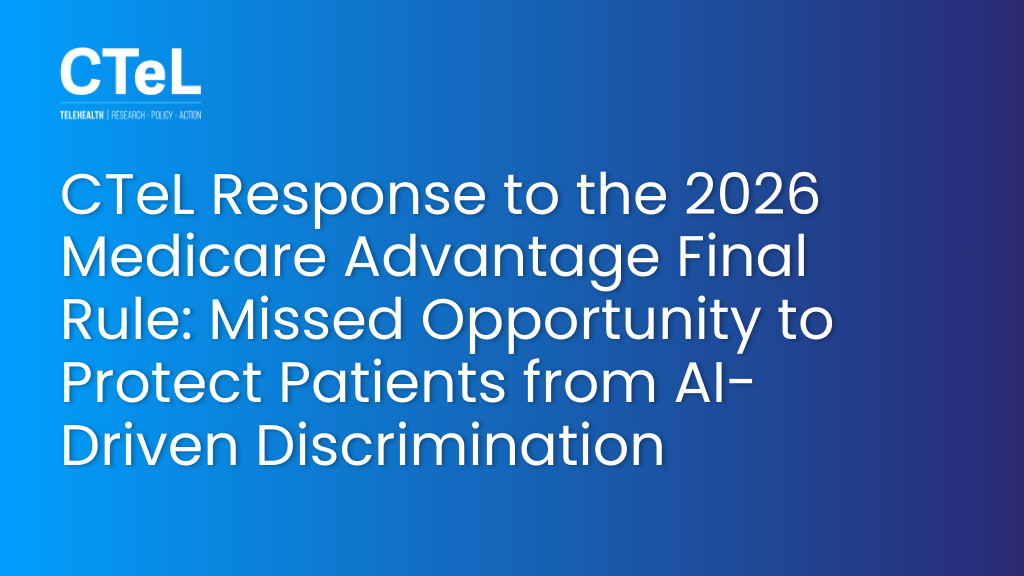CTeL Response to the 2026 Medicare Advantage Final Rule: Missed Opportunity to Protect Patients from AI-Driven Discrimination
The Center for Telehealth & e-Health Law (CTeL) expresses deep concern over the Centers for Medicare & Medicaid Services’ (CMS) omission of key language in its finalized Contract Year 2026 Policy and Technical Changes to the Medicare Advantage (MA) Program rule—specifically, language clarifying the applicability of anti-discrimination law to the use of artificial intelligence (AI) in MA plan administration.
In an era when AI rapidly transforms healthcare delivery, the failure to explicitly state that civil rights laws apply to algorithmic decision-making in federally funded health programs like Medicare Advantage is a critical oversight. CTeL views this as a missed opportunity to reinforce patient protections and promote equity in the use of emerging technologies.
Understanding the Broader Context: What Is Medicare Advantage?
Medicare Advantage (Part C) is an alternative to traditional Medicare, allowing beneficiaries to receive Medicare-covered benefits through private insurers. These plans now serve more than half of all Medicare beneficiaries—over 30 million people as of 2024 (KFF, 2024). As enrollment grows, MA plans have become a central component of the U.S. healthcare system, especially for older adults, people with disabilities, and those with complex care needs.
Insurers increasingly use AI tools to assess patient risk, determine coverage, and automate administrative processes. While these tools offer efficiency, they also raise serious concerns about bias, opacity, and potential discrimination—especially when deployed without transparency or oversight.
CTeL’s Position on AI and Anti-Discrimination Law
Earlier this year, CTeL submitted comments supporting CMS’ proposal to clarify that AI systems used by Medicare Advantage plans must comply with existing civil rights statutes such as Section 1557 of the Affordable Care Act and Title VI of the Civil Rights Act of 1964.
“Biases can be introduced into AI systems at every stage of development and can severely hinder the effectiveness of the tool once implemented. We share the Agency’s concern that algorithmic bias is pervasive and can exacerbate health injustices if left unaddressed,” CTeL wrote in its public comment.
Unfortunately, in its final rule, CMS acknowledged stakeholder concerns but chose not to finalize the proposed provision:
“CMS, however, does want to acknowledge the broad interest in regulation of AI and will continue to consider the extent to which it may be appropriate to engage in future rulemaking in this area.”
CTeL believes this response falls short of the moment. As AI becomes more embedded in care delivery, the lack of explicit accountability creates legal gray areas that could undermine patient trust and civil rights.
The Path Forward: Advocacy, Accountability, and Action
CTeL calls on CMS and other federal agencies to remain vigilant and proactive in monitoring AI use in Medicare and Medicaid programs. We urge policymakers to:
Explicitly affirm the applicability of civil rights laws to AI-driven healthcare decisions.
Promote algorithmic transparency and require testing for bias.
Hold MA plans accountable for outcomes generated by automated systems.
CTeL continues to advance this work through its Artificial Intelligence Blue Ribbon Collaborative, which brings together thought leaders in law, ethics, technology, and healthcare to confront these challenges head-on. This initiative exemplifies CTeL’s commitment to fostering a digital health system that is just, equitable, and accountable.
References
Kaiser Family Foundation (KFF). (2024). Medicare Advantage 2024 Spotlight: First Look. Retrieved from https://www.kff.org
Centers for Medicare & Medicaid Services (CMS). (2025). Contract Year 2026 Policy and Technical Changes to the Medicare Advantage Program. Retrieved from https://www.cms.gov
U.S. Department of Health and Human Services (HHS). (n.d.). Section 1557 of the Affordable Care Act. Retrieved from https://www.hhs.gov/civil-rights

